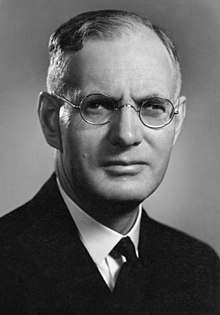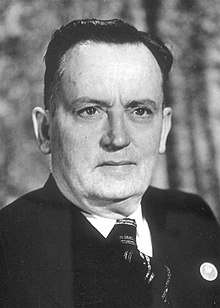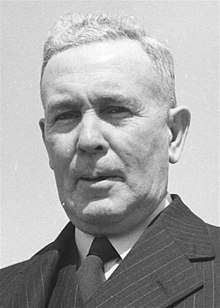1945 in Australia
The following lists events that happened during 1945 in Australia.
| 1945 in Australia | |
|---|---|
| Monarchy | George VI |
| Governor-General | Alexander Hore-Ruthven, 1st Earl of Gowrie, then Duke of Gloucester |
| Prime minister | John Curtin, Frank Forde, Ben Chifley |
| Population | 7,391,692 |
| Elections | VIC |
| |||||
| Decades: |
| ||||
|---|---|---|---|---|---|
| See also: | |||||
Incumbents
- Monarch – George VI
- Governor-General – Alexander Hore-Ruthven, 1st Baron Gowrie (until 30 January), then the Duke of Gloucester
- Prime Minister – John Curtin (died in office 5 July), then Frank Forde (until 13 July), then Ben Chifley
- Chief Justice – Sir John Latham
State Premiers
- Premier of New South Wales – William McKell
- Premier of Queensland – Frank Cooper
- Premier of South Australia – Thomas Playford IV
- Premier of Tasmania – Robert Cosgrove
- Premier of Victoria – Albert Dunstan (until 2 October), then Ian MacFarlan (until 21 November), then John Cain
- Premier of Western Australia – John Willcock (until 31 July), then Frank Wise
State Governors
- Governor of New South Wales – John Loder, 2nd Baron Wakehurst (until 6 June)
- Governor of Queensland – Sir Leslie Orme Wilson
- Governor of South Australia – Sir Charles Norrie
- Governor of Tasmania – Sir Ernest Clark (until 4 August), then Sir Hugh Binney (from 24 December)
- Governor of Victoria – Sir Winston Dugan
- Governor of Western Australia – none appointed
Events
- 30 January – Prince Henry, Duke of Gloucester becomes Australia's first royal Governor-General.
- 31 January - A Stinson aircraft crashes in Victoria, killing all 10 on board.
- 9 May – Germany surrenders to the Allies, ending World War II in Europe.
- 26 June – Dr H. V. Evatt signs the United Nations Charter on behalf of Australia.
- 8 to 30 June – Perth receives 476.1 millimetres (18.74 in) of rain in twenty-three days, easily its heaviest monthly rainfall on record[1] and unlikely to be approached due to anthropogenic global warming.[2]
- 5 July – Prime Minister John Curtin dies in office from heart problems at The Lodge in Canberra.
- 6 July – Frank Forde is sworn in as Prime Minister of Australia, following the death of John Curtin. He will serve Australia's shortest term as Prime Minister, being replaced by Ben Chifley a week later.
- 7 July – The Australian 7th Division commences operations in the Battle of Balikpapan. Operations are completed by 21 July.
- 13 July – Ben Chifley is elected as leader of the Australian Labor Party, becoming the 16th Prime Minister of Australia.
- 15 August – Japan surrenders to the Allies, ending World War II. The day is known as V-P Day (Victory in the Pacific).
- 10 November – A general election is held in Victoria.
Science and technology
- 12 December – Howard Florey shares the Nobel Prize in Physiology or Medicine for his work on penicillin.
Arts and literature
- William Dargie wins the Archibald Prize with his portrait of Edmund Herring
- Russell Drysdale painted The Drover's Wife
Film
- 1 May – The Australian National Film Board is established.
Sport
- 1 September – Eastern Suburbs defeats Balmain 22–18 in the final of the 1945 New South Wales Rugby Football League season.
- 29 September – The 1945 VFL Grand Final is held, and becomes known as the "Bloodbath" due to the wet, muddy conditions and frequent violence between players and amongst the spectators. Carlton defeats South Melbourne 15.13 (103) to 10.15 (75).
- 6 November – Rainbird wins the Melbourne Cup.
- 26 December – The first Sydney to Hobart Yacht Race begins. The British yacht Rani wins both line honours and the handicap, arriving in Hobart on 3 January.
Births
- 1 January – Peter Duncan, politician
- 2 January – Diane Fahey, poet
- 2 January – Byron Lamont, botanist
- 8 January – Jeannie Lewis, musician
- 10 January – John Fahey, 38th Premier of New South Wales (1992–1995)
- 15 January – John Peard, rugby league player and coach
- 19 January – Judith Clingan, composer and musician
- 22 January – Arthur Beetson, rugby league player and coach (died 2011)
- 22 January – Ken Ticehurst, politician
- 26 January – John Coates, mathematician
- 28 January – Peter Cochran, politician
- 11 February
- Ralph Doubell, Olympic athlete
- Peter Blackmore, politician
- 23 February – Robert Gray, poet
- 26 February – Peter Brock, racing driver (died 2006)
- 3 March – George Miller, film director and producer
- 16 March – Michael Cobb, politician
- 10 April – Kevin Berry, butterfly swimmer (died 2006)
- 13 April – Judy Nunn, actress, author
- 8 May – Janine Haines, politician (died 2004)
- 17 May – Tony Roche, tennis player
- 22 May – Bob Katter, politician
- 27 May – George Thompson, politician
- 29 May – Chris Barrie, Chief of the Defence Force
- 1 June – Kerry Vincent, chef and author
- 2 June – Michael Leunig, cartoonist
- 10 June – Martin Wesley-Smith, composer (died 2019)
- 5 July – Johnny Famechon, boxer
- 8 July – Graeme Blundell, actor
- 13 July – Ashley Mallett, cricketer
- 17 July – Athena Starwoman, astrologer (died 2004)
- 18 July – Max Tolson, soccer player
- 21 July – Geoff Dymock, cricketer
- 1 August – Ken Aldred, politician (died 2016)
- 2 August – Alex Jesaulenko, Australian rules football player
- 7 August – Graham Ramshaw, Australian rules football player (died 2006)
- 12 August – Mal Washer, politician
- 18 August – Gillian Bouras, writer
- 23 August – Ian McManus, politician
- 27 August – Kerry O'Brien, television journalist
- 22 October – Clover Moore, politician, 82nd Lord Mayor of the City of Sydney (2004–present)
- 25 October – Peter Ledger, illustrator (died 1994)
- 26 October – John Romeril, playwright
- 1 November – John Williamson, singer
- 15 November – Roger Donaldson, New Zealand film director
- 19 November – Barry Haase, politician
- 26 November – Roger Price, politician
- 28 November – John Hargreaves, actor (died 1996)
- 5 December – Joanne Burns, poet
- 7 December – Bob Martin, politician
- 15 December – Thaao Penghlis, actor
- 22 December – Sam Newman, Australian rules football player and media personality
- 31 December – Vernon Wells, actor
Deaths
- 28 January – Samuel Dennis (born 1870), politician
- 4 March – Harry Chauvel (born 1865), soldier
- 5 March – Rupert Downes (born 1885), soldier
- 6 April – Paddy Stokes (born 1884), politician
- 15 April – Tom Collins (born 1884), politician
- 5 June – Albert Piddington (born 1862), High Court judge, lawyer and politician
- 5 July – John Curtin (born 1885), Prime Minister of Australia (1941–1945)
- 11 July – Frank Hill (born 1883), politician
- 29 July – Henry Burrell (born 1873), naturalist
- 5 August – Alfred Reid (born 1867), politician
- 20 August – Sir Macpherson Robertson (born 1859), confectioner
- 6 September – David Hall (born 1874), politician and barrister
- 15 September – William Calman Grahame (born 1863), politician
- 15 October – Tom Swiney (born 1875), politician
- 12 November – Reginald Weaver (born 1876), politician
- 6 December – Sir Edmund Dwyer-Gray (born 1870), Premier of Tasmania (1939)
gollark: I recommend libdatatape for all your tapey needs. It handles all their oddities, and is capable of serializing stuff nicely.
gollark: (libdatatape takes four bytes though, for data length)
gollark: In any case, tapes are quite big.
gollark: MiB is, er, some different number (1024 * 1024?).
gollark: Actually, MB is 1000000 bytes.
References
This article is issued from Wikipedia. The text is licensed under Creative Commons - Attribution - Sharealike. Additional terms may apply for the media files.


